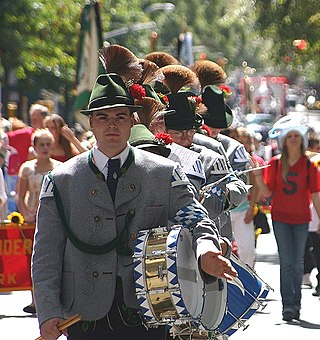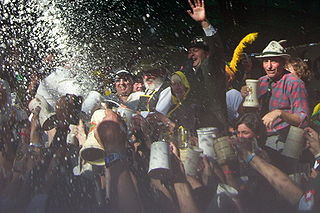
Carnival is a Western Christian festive season that occurs before the liturgical season of Lent. The main events typically occur during February or early March, during the period historically known as Shrovetide. Carnival typically involves public celebrations, including events such as parades, public street parties and other entertainments, combining some elements of a circus. Elaborate costumes and masks allow people to set aside their everyday individuality and experience a heightened sense of social unity. Participants often indulge in excessive consumption of alcohol, meat, and other foods that will be forgone during upcoming Lent. Traditionally, butter, milk, and other animal products were not consumed "excessively", rather, their stock was fully consumed during Shrovetide as to reduce waste. This festival is known for being a time of great indulgence before Lent, with drinking, overeating, and various other activities of indulgence being performed. For example, pancakes, donuts, and other desserts are prepared and eaten for a final time. During Lent, lacticinia and animal products are eaten less, and individuals make a Lenten sacrifice, thus giving up a certain object or activity of desire.

Von Steuben Day is a holiday traditionally held on a weekend in mid-September, celebrating the Prussian-born Baron Friedrich von Steuben, who arrived in the United States as a volunteer offering his services to General George Washington in the American Revolutionary War. Von Steuben is still regarded as one of the most important German Americans, as his training of the young American troops made victory against the British possible. Thus, his work helped gain independence for the United States of America. The day is generally considered the German-American event of the year, and many participants wear tracht costumes, including dirndls and lederhosen, to celebrate their heritage. Celebrations focus on parades where participants march, dance, and play music.

The Toronto Caribbean Carnival, formerly known as Caribana, is a festival of Caribbean culture and traditions held each summer in the city of Toronto, Ontario, Canada. It is a pan-Caribbean Carnival event and has been billed as North America's largest street festival, frequented by over 1.3 million visitors each year for the festival's final parade and an overall attendance of 2 million.

Kitchener–Waterloo Oktoberfest is an annual nine-day festival in the twin cities of Kitchener–Waterloo, Ontario, Canada. Based on the original German Oktoberfest, it is billed as Canada's Greatest Bavarian Festival, and is the second-largest Oktoberfest in the world. It is held every October, starting on the Friday before Canadian Thanksgiving and running until the Saturday after. Estimates indicate that the event attracts roughly 700,000 visitors to Waterloo Region, Ontario every year.

A beer festival is an event at which a variety of beers are available for purchase. There may be a theme, for instance beers from a particular area, or a particular brewing style such as winter ales.

The G. Heileman Brewing Company of La Crosse, Wisconsin, United States, was a brewer that operated from 1858 to 1996. It was ultimately acquired by Stroh's. From 1872 until its acquisition, the brewery bore the family name of its co-founder and brewer Gottlieb Heileman.

Nisei Week is an annual festival celebrating Japanese American (JA) culture and history in Little Tokyo, Los Angeles. Nisei means 2nd generation in Japanese, describing the first American born Japanese, a group which the seven-day festival was originally meant to attract. Though named for the Nisei generation, Nisei Week is no longer targeted at Niseis, nor is the festival still contained within a week. Nisei Week Foundation president for 2006, Michelle Suzuki, described the festival as "the opportunity for people of all backgrounds to celebrate Japanese heritage and culture".
A Volksfest is a large event in German-speaking countries which usually combines a beer festival or wine festival and a travelling funfair. Attractions may include amusement rides, games of chance and skill, and food and merchandise vendors.

The Oktoberfest is a two-week festival held each year in Munich, Germany during late September and early October. It is attended by six million people each year and has inspired numerous similar events using the name Oktoberfest in Germany and around the world, many of which were founded by German immigrants or their descendants.

The Carnival Band is a marching band and community orchestra based in the Commercial Drive area of East Vancouver, Canada. It is a part of the Activist Street Band movement, which is best known in the United States through the HONK! festivals.

Oktoberfest is the world's largest Volksfest, featuring a beer festival and a travelling carnival, and is held annually in Munich, Bavaria, from mid- or late-September to the first Sunday in October, with more than six million international and national visitors attending the event. Locally, it is called d'Wiesn, after the colloquial name for the fairgrounds, Theresienwiese. Oktoberfest is an important part of Bavarian culture, having been held since the year 1810. Other cities across the world also hold Oktoberfest celebrations that are modeled after the original Munich event.

The Washington's Birthday Celebration (WBCA) is an almost month-long event held each February in Laredo, the seat of Webb County in south Texas, that celebrates the birthday of George Washington. It is the largest celebration of its kind in the United States with approximately 400,000 attendees annually. The celebration consists of various festivals; a Society of Martha Washington Colonial Pageant and Ball, Princess Pocahontas Pageant and Ball, two parades, a carnival, an air show, fireworks, live concerts, "Fun-Fest" at Laredo Community College, and a citywide prom during which many of the Laredo elite dress in Colonial attire. Each year a prominent Laredo man and woman play the roles of George and Martha Washington. One of its main events, the Jalapeño Festival, has recently been named one of Top 10 eating festivals in the United States.

There are several annual festivals in Delaware.
The Qingdao International Beer Festival is a yearly festival held in Qingdao in Shandong province, China. The event is jointly sponsored by national state ministries and the Qingdao Municipal Government.

Mardi Gras in the United States is not observed nationally across the country, largely due to the country's Protestant and Anglo-Saxon roots. Mardi Gras and Carnival are mostly Catholic holidays, while the United States has a Protestant-majority population. However, a number of cities and regions in the U.S. have notable Mardi Gras or Carnival celebrations. Most of these places trace their Mardi Gras celebrations to French, Spanish, and other Catholic colonial influences on the settlements over their history. The earliest Carnival celebration in North America occurred at a place on the west bank of the Mississippi River about 60 miles (97 km) downriver from where New Orleans is today; this Mardi Gras on March 3, 1699, and in honor of this holiday, Pierre Le Moyne, Sieur d'Iberville, a 38-year-old French Canadian, named the spot Point du Mardi Gras near Fort Jackson. The earliest organized Carnival celebrations occurred in Mobile, then the capitol of French Louisiana known as Fort Louis de la Mobile, where in 1704 the first known Carnival secret society. In 1856, six Mobile natives established the first secret society, or krewe, in New Orleans, the Mistick Krewe of Comus. Former French and Spanish colonies such as Pensacola, Biloxi, and settlements along the Gulf Coast all followed suit in incorporating Carnival into their annual celebrations, which today have developed either separate traditions or variations of them from one another. In addition, modern activities generally vary from city to city across the U.S.
Oktoberfest may refer to:













